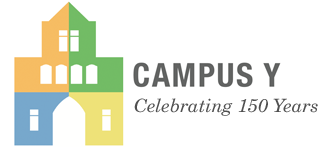The following blog was written by Aryana Bolourian, a rising Junior in the Bonner Leaders Program at the Campus Y. Aryana works at the Teen Center as a Bonner; she is working with AISEC in Santiago Chile this summer through the Bonner International Summer of Service internship.
After working at Protectora de la Infancia for over a week, the kids have grown attached to me and I to them. I genuinely care for these children…. The past week, I spent a majority of my time with the two-year-olds and partook in activities such as mashing up cookies and covering them in manjar (a Chilean version of Dulce de Leche) and painting eggshells blue to eventually create a mosaic of an ocean.
I’ve had to learn the unique ways to deal with each child, and it has been rewarding to see their reactions when I understand what they want or need to feel happy. One of the little girls, nicknamed Cote, has found a special place in my heart. She always greets me with a toothy smile and asks how I’m doing every morning. She then tells me the name of her mom and dad and explains that she has a dog named Tommy and that he is white and fluffy. Every day at naptime, she comes up to me and with puppy-dog eyes and says “Libre soy.” The first time this happened, I didn’t understand, ignored her request, and asked her to go to sleep. But, she refused to lie down, and instead climbed into a shelving unit. When I asked her what she meant, she began to sing. “Libre soy, libre soy,” and I recognized the tune. It was the Spanish translation of Frozen’s “Let it Go.” I pulled out my phone, googled libre soy, and Cote fell asleep grinning as she watched Elsa sing through her struggles of her icy touch. While I finally understood Cote, “Libre Soy” was not the only new Spanish vocab I picked up since I’ve been here.

A Guide to Chilean
When I decided to volunteer abroad, I knew I wanted an experience in a country where I could practice my Spanish. My mother is Venezuelan, so I grew up learning the language, but when I hit kindergarten, I begged her to speak to me in English. The kids at school didn’t speak Spanish, and I didn’t want to be the odd one out. Along with never taking piano lessons, this has to be my biggest regret in life. Attaining fluency in a second or third language is an incredible skill to have, and I hope to feel more comfortable speaking in Spanish before I leave here. However, when I informed my mom that I wanted to go to Chile, she seemed a bit hesitant, knowing that in Chile…they don’t speak Spanish, they speak Chilean.
These are a few of the words I’ve picked up since I’ve been in Santiago. They are unique to Chile, and without them it is quite difficult to make conversation with a Chilean.
Bacán (adj.)—cool, sick, awesome; When hanging out with my host, her friends often described people as bacán. When texting, they use bkn.
Cachai (phrase)—This word basically translates to “you know?” or “got it?” and is used at the end of practically every sentence. It is derived from the English verb “to catch.” I finally began to catch on before I realized it can be conjugated as well. For example, “Sí, cacho” means yes I get it. Chilean Spanish is tough, cachai?
Carretear (v.)— to party, to go out; For example, my coworkers at Protectora de la Infancia asked “este fin de semana te vai a carretear?” which translates to “are you going out this weekend?”
Fome (adj.)—lame, boring
Luca (n.)—1000 Chilean Pesos; Paying for food was tough until I learned this word. The cashier would say “Cinco Luca (five luca),” and I would stare back blankly, hand him all my pesos, and hope he would give me change. Fun Fact: currently 1 USD = 687.46 Chilean Pesos.
Po’ (conj.)—So, then, well; It’s hard to define the word “po’,” but you can never really go wrong in saying it. When answering questions, Chileans often say, “sí, po’” or “no, po’” or “obvio, po.’” Throw a po and a cachai in your sentence and you’re golden.
Pololo/a (n.)—boyfriend/girlfriend The first time I was asked if I had a pololo back home, I had zero clue what it meant, so I said no. (Sorry Tyler!) The word can also be used as a verb. If a person is in a relationship, then he/she/ze is “pololeando.”
Weon/weona (n., adj, v. every part of speech)—My favorite word in Chilean is weon. Now, I will admit, it is not necessarily the most appropriate of words, and I would not suggest using it with an elder or in a professional setting, but in every day Chile it is used constantly. It can refer to a person, a place, an action, a friend, a jerk, etc. Forms of this word include, weon, wea, aweonao, etc.
Parque Bicentenario and Farellones/Valle Nevado (in the Andes)
Finally, I want to recount a couple of my travel experiences from this week! I visited a beautiful park with my host, Estefanía and my friend, Marc. The park was in the middle of Santiago, and it was a beautiful escape from the concrete world around us. I enjoyed the brisk weather and took pictures with flamingos, played with my host father’s dog, Timon, in the dog park, and fed ducks.
This past weekend, a group of AIESEC members and I, took a day trip to the mountains and played in the snow, ate lunch with a gorgeous view, and went tubing! I had been to mountains in the US before but never to the Andes. I definitely recommend a visit!

